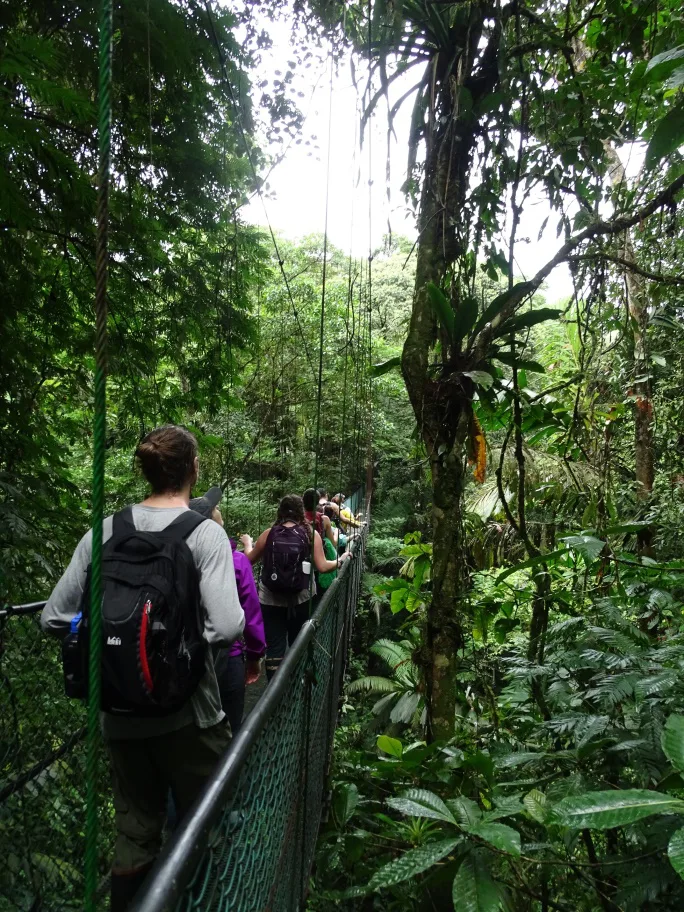Venturing Outside Our Comfort Zones
“Just standing here is forcing me to shift my mental framework. I’m used to being outside and recognizing the trees and the birds and understanding what’s going on in the environment around me. But here, none of it makes any sense.”
I overheard a student make this observation on our first field trip to a lowland rainforest on the Caribbean side of the country. We’d stopped to hear Edgardo, the tropical ecology professor, explain epiphytes (plants that grow in nooks on other plants in the forest understory). As the student listened, she spun around slowly, taking in the forest around her. She was trying, unsuccessfully, to understand the rainforest based on her knowledge of the forests of New England and beginning to shift the way she saw the environment around her.

Students hike through Tirimbina Biological Reserve
In our current political climate, the dominant discourse says we need to get out of our social boxes and put ourselves in places to encounter people of different races, genders, sexualities, nationalities, class and political background. That, by doing so, we will gain a better, more holistic understanding of each other and create a stronger society that is more prepared to deal with the problems we are facing now.
I think this is exactly what SFS does. It takes students out of their home environments, where they’ve grown up observing or gone to college studying the natural world around them and puts them in a new foreign environment that they don’t understand. Then, throughout the course of their time here, they learn how to navigate the Costa Rican environment with unexpected ease.

A view of the forest canopy in the rainforest at Manú Lodge
We start small, answering questions such as: Why does Costa Rica have only two seasons? How does having a rainy and dry season affect the flora and fauna? As the semester progresses, students make more complex observations, finishing with Directed Research, where students ask their own questions such as: What is the relationship between road noise and the frequency of bird calls? or How do education levels affect Costa Ricans’ perceptions of climate change?

Class given by Achim on the beach at the Tarcoles River, one of the most polluted beaches in the country
On that same field trip, we also visited a family-owned sustainable farm. During our tour of the farm, we had to opportunity to milk their dairy cows. One student, after succeeding (at last) at milking the cow, turned and said to me, “It didn’t occur to me that the milk would be warm. It makes perfect sense, but I’d never really thought about it before.”
Later in the tour, we stopped by to meet the pigs, just one of many steps in their extensive composting system. Another student looked shocked at catching sight of a pig. “It’s huge!” she exclaimed, “I’ve never seen a pig that big before!” After staring in disbelief at the pig for another minute she said, “Actually, I’ve never seen a pig before. Why haven’t I seen a pig before?”, which led her and another student into an in-depth conversation about the food industry in the U.S. and it how differs from what we were seeing at this farm.
These sorts of experiences are the backbone of what makes students’ time here in Costa Rica meaningful. Students are given the space and the instruction to evolve from a complete lack of understanding of their host country to asking complex questions and using what they’ve seen to think critically about their world back home. It’s this sort of exploring outside your geographic and cultural comfort zones that allows students to gain an understanding of global – and personal – relationships with the natural world.
In other words, SFS is exactly what we need right now.

A hermit crab found on Tarcoles beach, using a plastic bottle cap as its shell
Related Posts

Camila Rojas: Alumni Spotlight⭐

